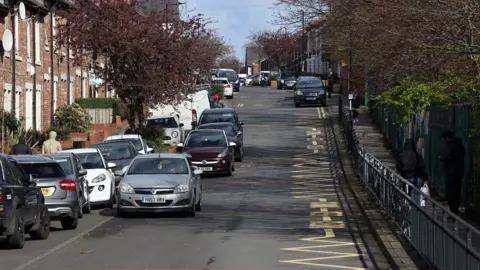School traffic-ban pilot scheme ends
 BBC
BBCA pilot project aimed at cutting congestion outside school gates has come to an end.
The scheme in Newcastle had seen restrictions outside four primary schools to turn their surroundings into pedestrian and cycle zones at pick-up and drop-off times.
While the measures will become permanent at the schools who took part in the trial, plans to roll out the School Streets scheme to a total of 11 sites will no longer progress, described as "concerning" by one local cycling charity.
The authority said it intended to "build" on the work to improve road safety and encourage walking, wheeling and scooting to school elsewhere.
The project, which saw funding provided to walking and cycling charity Sustrans, saw streets outside schools closed to traffic from 08:00 until 09:30, and again from 14:30 until 16:00.
The measures will be permanent at Ravenswood Primary, Chillingham Road Primary, Hotspur Primary and Grange First School.
Officials said while they would no longer be working with Sustrans, the Labour-led council would remain open to implementing similar measures outside other schools.
'Worrying trend'
The scheme was first touted as a possibility in 2019, with the experimental restrictions scheduled to begin in the summer of 2021.
But it took until May 2022 for the first 18-month trial, at Hotspur Primary in Heaton, to begin and there have been no new School Streets announced since the fourth trial launched at Ravenswood Primary in February 2023.
The Newcastle Cycling Campaign said it was "concerned" by the news and warned the council against "backtracking" on such measures, having also been critical of the removal of several Low Traffic Neighbourhoods.
The group told the Local Democracy Reporting Service: "Road safety is not the same as removing traffic, and there appears to be a worrying trend here of backtracking on policy commitments that boldly prioritised people over motor vehicles."
Ali Campion, Sustrans' school streets coordinator, said she was "delighted" the four trials had been made permanent and expressed hope more would follow.
A council spokesperson described it aimed to "build" on the "successful" work.
"The development of these pilot schemes have relied on local engagement, carried out by Sustrans, which has helped us to understand how this type of scheme could work," they added.
“We are now concluding this pilot process and would like to thank Sustrans for their contribution to this project."
